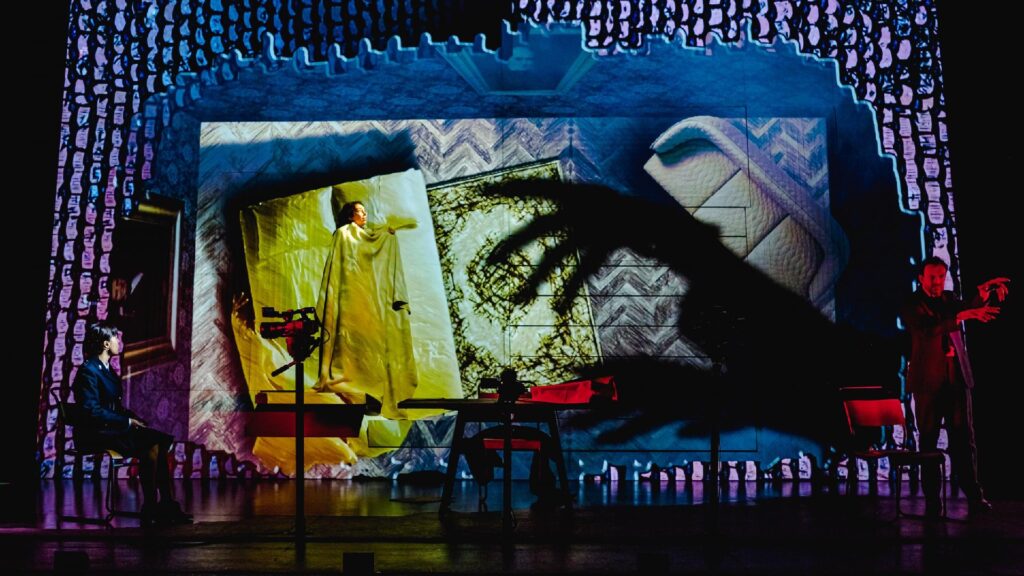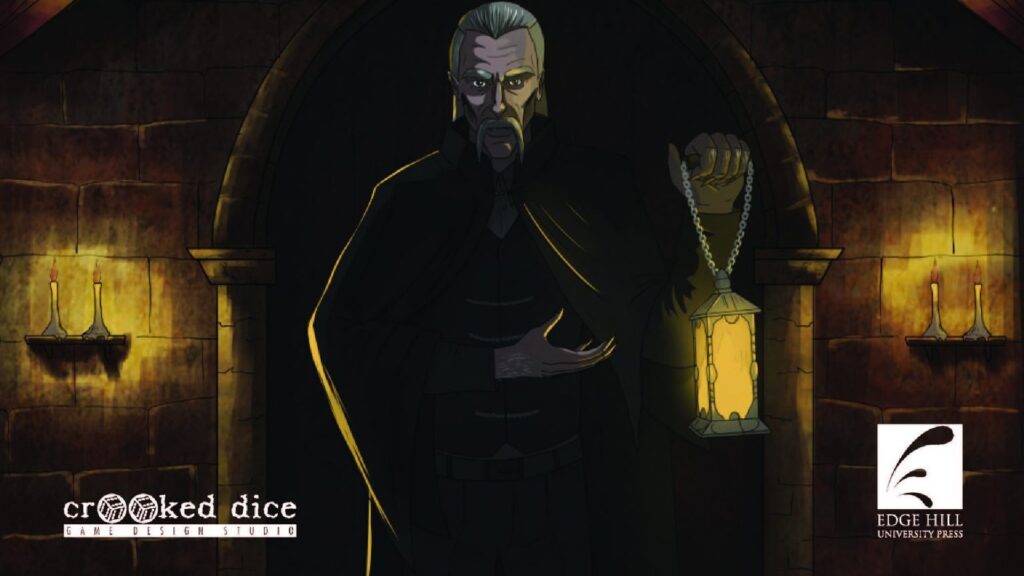Year 2 students Abbie Hope and Katherine Duffy explore the long afterlife of Dracula, what the vampire means for culture today, and some of the events coming up at Edge Hill as we head into the 125th anniversary year of Bram Stoker’s novel.

This October, Liverpool’s Playhouse Theatre hosted five nights of Imitating the Dog’s innovative new production of Dracula: The Untold Story. Riana Duce plays Mina Harker and tells us that the play – which is set 70 years after Dracula’s demise – is a recollection of ‘the events that have led her [Mina] to hand herself into a police station in 1965.’
Even to the most dedicated drama enthusiasts, Dracula: The Untold Story would be an extraordinary encounter with the surrealist escapism of theatre. The play uses a combination of live-acting and technology to bring new life to Stoker’s characters through the medium of the graphic novel. For us as unseasoned theatre-goers but avid Dracula fans, the production was as magnificent and groundbreaking as we had hoped. Using only three actors, three cameras, and a variety of props, Imitating the Dog manages to create a visual masterpiece that celebrates and expands upon the legacy that Stoker created with Dracula as well as the long tradition of cinematic reworkings of Stoker’s Count.

In addition to the technical aspects of the play, the importance of Dracula: The Untold Story focusing on Mina Harker should not be lost on audiences. This Mina is an empowered and resourceful but lost woman who is struggling with the grief and loss of the immortality that had once been granted to her by Dracula. Duce describes this incarnation of Mina as a presentation of ‘a “New Woman” in action beyond the constraints of the 19th century’ and the production as a ‘refreshingly female-led modern take on the story’ that would have previously been rejected by Victorian audiences. As seen with previous adaptations, Mina’s intellect is often stripped away and replaced with a sexuality that appeals to the male gaze; she is often presented as either a seductive reincarnation of Dracula’s deceased wife or his lover. Subsequently, Imitating the Dog’s portrayal of Mina is appealing because it returns to aspects of Stoker’s original, savvy heroine – she is no longer a sexual device for Dracula but instead a ‘powerful, passionate, well-intentioned woman, who is also deeply misguided and flawed’ (Duce).
A Fang-tastic Legacy
Imitating the Dog’s production is just one of thousands of theatrical, novelistic and cinematic adaptations of Stoker’s vampire with many more likely to follow as we head into the 125th anniversary year of Dracula.
What is the first thing that comes to mind when you think of the vampire? We asked a group of Edge Hill’s Literature and Creative Writing students this question, with many of them referencing descriptions of Dracula’s physicality: ‘tall old man’, ‘long black capes’, ‘long nails’ and ‘fangs’. Evidently, the figure of the vampire is still synonymous with Dracula, which speaks volumes about Stoker’s legacy considering the popularity of the vampire literary genre in the 1800s.
Stoker used his vampire to symbolise Victorian fears of urbanisation, medical advancements and even threats to the British Empire. But what does the figure of the vampire represent today? Asking the same group of students about modern vampires, we found that unsurprisingly, many thought of the ‘sparkly’ vampires in Stephanie Meyer’s Twilight, as well as Buffy The Vampire Slayer, BBC’s Dracula, and Anne Rice’s Interview with a Vampire. Alongside these were ideas of isolation, lust, and fear of death, all motifs present in Stoker’s original work. The representation of these anxieties have carried through to modern day adaptations, highlighting our ongoing need for the vampire figure as a cultural figure to fear, and ultimately overcome.
Celebrating the 125th anniversary of Dracula at Edge Hill

This year Edge Hill University and EHU19 Centre for Nineteenth Century Studies will be exploring the legacies of Stoker’s novel in a series of exciting events:
- Dr Peter Wright is working with Crooked Dice Games, with students from across English, History and Creative Writing, and with Dacre Stoker – Bram Stoker’s great-grand nephew – to produce an authentic adaptation of Dracula as a tabletop game.
- EHU19 Research Centre has welcomed Dr Madeline Potter as ‘Nineteenth Century Matters’ Fellow and Dr Potter will be exploring in her research the cultural connections between vampires and theology.
- Students at Edge Hill can also learn about the cultural significance of the vampire and analyse a range of vampire novels and films on the module LIT3054: Special Topic 2 (Vampire Fictions).
- 2022 will also see the launch of events, exhibitions and talks on Stoker’s work, including a Q&A with Dacre Stoker – so get your question ready if you dare!

